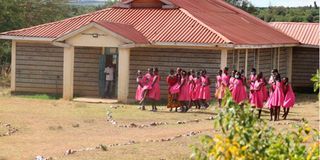Breaking: Autopsy reveals how Cyrus Jirongo died
Samburu girls shine in KCSE

Students of Samburu Girls Foundation in Loosuk area, Samburu County. The girls survived FGM and forced marriages to post exemplary performance in this year's KCPE.
What you need to know:
- Samburu girls are finding their way out of the cocoon with a majority defying odds to register for national examinations.
- St Theresa's Girls School was among the top schools nationally; with a mean score rose from 8.9 in 2019 to 9.1 in 2020, making it a top performer in Samburu.
Stories about female circumcision, early marriages and other retrogressive cultural acts are common in Samburu County.
Girls are the most affected by these outdated cultural prevalence and most are forced out of school to fulfil ‘what the culture dictates’.
For decades, there has been spirited activism to end these traditional practices. The most recent was the Kisima Anti-FGM Declaration, an event that was officiated by President Uhuru Kenyatta on March 5.
Samburu girls are finding their way out of the cocoon with a majority defying odds to register for national examinations. Statistics from the Samburu County Education office show that 2,435 candidates sat their KCSE exams out of which 892 were female.
At the Ministry of Education, data shows that Mandera, Wajir, Turkana, Garissa and Homa Bay are the only counties that had more boys than girls sit the 2020 KCSE. For the first time, Samburu County was excluded.
St Theresa's Girls School
Nationally, out of the 747,161 students who sat the exam, 366,834 were girls, with Education CS Prof George Magoha noting that the enrolment of girls in Mandera, Wajir, Garissa and Turkana counties was half that of boys.
St Theresa's Girls School in Samburu was among the top schools nationally. The school mean score rose from 8.9 in 2019 to 9.1 in 2020, making it a top performer in Samburu. All 41 candidates in the missionary-run school scored direct university entry grades with the last student attaining a mean grade of B-.
The first girl Engosan Lilian Buchu, scored a mean grade of A- of 78 points followed by Lekoitip Santima Noimah who scored A- of 76 points. Six girls scored 74 points and above. The school director Peter Leseketet attributed the success to dedication, hard work and prayers.
"We are very proud to have sent all our girls to university. It is not easy because the calendar year was disrupted due to the pandemic. This is the power of prayer, dedication and hard work," he said.
Though the school did not produce a top performer nationally, their performance is way above some of the schools with big names nationally. The school took position 20 as the best in the 2020 KCSE results.
Leading by example
Mr Leseketet said the results mirror how far Samburu girls have come to snatch top spots.
"It is positive results for a community that believed girls had no room in the society. We are leading by example," Mr Leseketet told Nation.Africa.
Other girls’ schools that posted exemplary performance include Kisima Girls High School and Baragoi Girls High School.
Samburu County Education director David Koech said more girls are enrolling in schools, a rare gesture in the past. Despite introduction of free primary and secondary education in Kenya in 2003 that led to an increase in school enrolment across the country, the rates in Samburu remain low owing cultural practices.
Mr Koech appealed to parents to allow girls to complete their studies "because they have huge room in the modern society."
"We continue to appeal to parents to bring children to schools because the government is catering for each individual," Koech said.
During the Kisima Declaration to end FGM in Samburu County, President Uhuru said girls, if given an education, could make good leaders. The Head of State said the Kisima Declaration was vital on ending harmful practices like FGM and early marriages that had worsened violation of women’s rights and dignity in the semi-nomadic community.
African traditions
"Girls are marketable when they have gone to school. I tell you elders that you will receive double or even triple dowry when your girl child is educated. They can make very good leaders if given a good base and platform, and Ms Lesuuda here is a testimony," the President said.
Kenyatta tasked the elders and other opinion-shapers to sensitize communities on the need to abandon circumcision for women and girls amid negative physical and psychological impacts.
He told Samburu community members to embrace alternative rites of passage and ensure girls finish studies.
“I want you (elders) to use your influence to enlighten the community on the hazards associated with FGM. We are not here to abolish our African traditions. I urge you to embrace alternative rites that do not harm girls and even boys," the president said during the Kisima Declaration.
Kenya has enacted legislation that prohibits female genital cut in line with global commitment to protect women and girls from all forms of abuse and discrimination.





